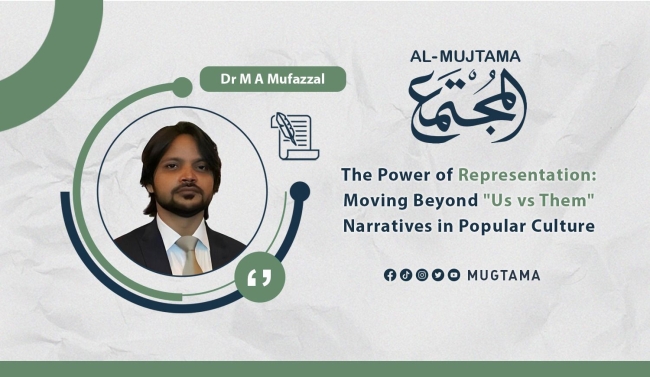The Power of Representation: Moving Beyond "Us vs Them" Narratives in Popular Culture
In contemporary times, the phenomenon of "us vs them" has been a recurring theme in popular culture, particularly in the form of propaganda movies. These narratives serve as powerful tools of ideological persuasion that reinforce the notion of a dichotomous worldview where one's identity is constructed in opposition to the other. Such narratives are not only simplistic and reductionist but are also potentially dangerous, as they tend to promote bigotry, hatred, and violence towards those who are perceived to be different.
The use of propaganda in popular culture is not a new phenomenon, and its effects are often far-reaching and devastating. The recent release of films such as The Kerala Story, which purport to depict the dangers of religious extremism and the recruitment of non-Muslim women into terrorist organizations, is a worrying trend. Such films often rely on a simplistic and binary us-vs-them narrative, which serves to create an environment of fear and distrust, and ultimately reinforces existing prejudices.
The narrative typically portrays the "us" as a homogeneous, virtuous, and victimized group, while the "them" is depicted as a monolithic, malevolent, and aggressive force. This simplistic and reductive portrayal of identity tends to create a sense of righteous indignation among the audience and reinforces their pre-existing biases and prejudices towards the "them". The Kerala Story, in particular, is a highly problematic film, which fails to provide a nuanced and thoughtful exploration of the complex issues surrounding religious extremism and the recruitment of women into terrorist organizations. Rather than providing a nuanced portrayal of the challenges faced by non-Muslim women in Muslim-majority societies, the film relies on tired stereotypes and simplistic characterizations, which serve to reinforce existing prejudices and to demonize an entire community.
Moreover, the film's use of propaganda is deeply troubling, as it serves to create an environment of doubt and dread. By presenting a simplistic and binary narrative in which non-Muslim women are portrayed as innocent victims and Muslims as bloodthirsty terrorists, the film effectively creates a polarizing environment in which dialogue and understanding become impossible. This binary opposition fails to recognize the complexities of identity and history and perpetuates a false narrative of victimhood and aggression.
Similar themes of "us vs them" can be observed in popular movies from Bollywood and Hollywood. For instance, the 2014 Bollywood movie "PK" constructs a binary opposition between the religious and the secular, where the religious are depicted as gullible and superstitious, while the secular are rational and enlightened. This dichotomy reinforces the prevalent stereotype that religion is an impediment to progress and rationality and serves to alienate the religious from the secular. Likewise, Hollywood movies such as "American Sniper" and "Zero Dark Thirty" construct a binary opposition between the West and the East, where the West is portrayed as a righteous and heroic force, while the East is depicted as a barbaric and terrorist threat. Such narratives not only fail to acknowledge the complexities of identity and history but also contribute to the perpetuation of cultural stereotypes and prejudice.
The danger of such narratives lies in their potential to incite hatred and violence towards those who are perceived to be different. The "us vs them" narrative tends to create a sense of moral superiority among the "us" and dehumanizes the "them", leading to the justification of violence and oppression. The recent increase in hate crimes and intolerance towards minorities in different parts of the world can be attributed, in part, to the prevalence of such narratives in popular culture.
To challenge such dangerous narratives, there is a need for alternative forms of cultural representation that recognize the complexities of identity and history. The portrayal of cultural differences should not be reduced to simplistic and binary oppositions but should be grounded in a nuanced understanding of diversity and pluralism. Rather than constructing an "us vs them" narrative, cultural representations should strive to create a sense of shared humanity and commonality of experience. This can be achieved through the promotion of intercultural dialogue, the celebration of cultural diversity, and the recognition of the fluidity and hybridity of identity.
To challenge these dangerous narratives, it is important to recognize that identity is complex and multifaceted. People belong to multiple communities, and their identities are not defined by a single characteristic. For example, a person can be both Indian and Muslim, or American and Mexican. By promoting a more nuanced and inclusive understanding of identity, we can challenge the simplistic narratives that are promoted in propaganda movies.
In conclusion, the prevalence of "us vs them" narratives in popular culture, particularly in the form of propaganda movies, poses a significant challenge to the promotion of cultural tolerance and understanding. Such narratives tend to perpetuate cultural stereotypes, reinforce prejudices, and incite violence towards those who are perceived to be different. To challenge such narratives, alternative forms of cultural representation that recognize the complexities of identity and history and celebrate cultural diversity should be promoted. It is important to recognize that the use of propaganda in popular culture is not a benign phenomenon. Rather, it serves to reinforce existing prejudices, to create an environment of fear and mistrust, and to ultimately undermine the principles of democracy and pluralism. As such, it is incumbent upon filmmakers and artists to approach these issues with nuance and sensitivity, and to resist the temptation to simplify complex issues in order to appeal to the lowest common denominator.
-------------------
The opinions expressed in this publication are those of the authors. They do not purport to reflect the opinions or views of "Al-Mujtama" or its members.


